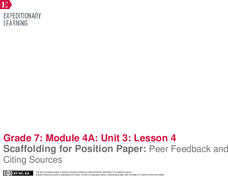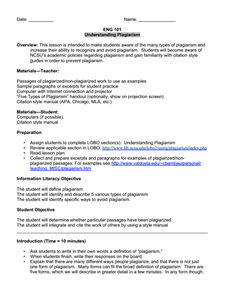Curated OER
Using Citations in a Research Paper
As a prequel to a research assignment, class members explore writing citations in the modern Language Association (MLA) and American Psychological Association (APA) formats. In pairs, or individually, researchers use books and magazines...
Digital Public Library of America
Teaching Guide: Exploring Little Women
Louisa May Alcott's Little Women is a literary masterpiece as well as a timestamp of the formative mid-nineteenth century in America. Using a primary source set of photographs, letters, and portraits, readers discuss the ways...
California Department of Education
Plagiarism is Stealing!
Stop, thief! Do your pupils understand the consequences of plagiarism? Lesson three of six in a series of college and career readiness activities demonstrates the dangers of taking credit for someone else's work. Learners engage in...
Curated OER
Bibliography of Mexico
Young scholars compile bibliographies on Mexico. For this global studies lesson, students investigate appropriate sources regarding Mexico and use the EasyBib web site to create an APA or MLA formatted bibliography.
Literacy Design Collaborative
Existentialism and Kafka
Scholars read Kafka's The Metamorphosis and research for essays and articles on existentialism. After gaining information and evidence from their research, pupils write essays defining existentialism and its relationship on the work of...
Encyclopedia Britannica
Candidate Position Research
As part of their study of the US Presidential election process, class members research a presidential candidate's position on a specific topic or topics. Formatting their research as a pro/con question ("Should the Death Penalty Be...
EngageNY
Scaffolding for Position Paper: Peer Feedback and Citing Sources
Scholars partner up for peer feedback of their position papers. After reviewing peer feedback guidelines, pairs take turns presenting their papers and completing a Peer Feedback Form. The class then has a mini lesson on MLA format.
US House of Representatives
Exclusion and Empire, 1898–1941
New ReviewOften forgotten and written off as the model minority, Americans with heritage in Asia and the Pacific Islands have played an essential role in American history, including Congress. Budding historians reclaim history by researching the...
US House of Representatives
From Exclusion to Inclusion, 1941–1992
New ReviewThe legacy of Japanese American internment impacted America for decades, including Congress. Class members consider the tenure of Asian American representatives in Congress and how the legacy of World War II affected their service. Other...
US House of Representatives
A Growing Diversity, 1993–2017
New ReviewConnect current events to the roles of AAPI members in Congress. Activities include tracing the impact of the Vietnam War on today's representatives. Learners have various options to explore, including role-play exercises and creating a...
American Psychological Association
Research Ethics
Psychologists designing experiments to research human behavior must consider weighty ethical concerns. Class members act as members of an institutional review board and examine proposals to determine whether included provisions...
American Psychological Association
Counting Fidgets: Teaching the Complexity of Naturalistic Observation
Why do psychologists conduct experiments in controlled laboratory settings? High schoolers gain an understanding of the importance of controls with an activity that involves naturalistic observations with no imposed controls.
American Psychological Association
Using Psychological Perspectives to Answer Questions on Behavior
Perspective is everything when it comes to assessing human behavior. Class members examine a series of statements and identify the perspective represented by each to demonstrate their understanding of different psychological perspectives.
American Psychological Association
Get Your Class Back! Free Your Class from Cell Phones in 5 Minutes
Welcome to a class in Cell Phones Anonymous! Rid students of their addiction with an easy, positive reinforcement, two-step program: turn them off and put them in a box at the front of the classroom. Each day they participate, they...
American Psychological Association
Statistical Significance
Our survey says ...! High school psychology scholars analyze how people create surveys. Three different scenarios help them discover the meaning behind statistical significance. Armed with new knowledge, novice psychologists uncover what...
Curated OER
Clouds
Incorporate art and poetry into an early elementary science lesson plan about cloud formation. With fun and engaging activities that follow a natural learning progression, youngsters will develop key vocabulary and conceptual...
Curated OER
Persecution
Eleventh graders determine the causes and effects of persecution. They read The Crucible by Arthur Miller. They analyze the historical significance of persecution. They use technology to research types of persecution.
North Carolina State University
Integrating Your Research
Employ this resource to expand efficient ideas on how to present and organize activities that describe how researchers can implement their research by using direct quotes, paraphrasing, and summarizing—without plagiarizing. Activities...
Digital Public Library of America
Teaching Guide: Exploring To Kill a Mockingbird
Harper Lee's To Kill a Mockingbird, considered by many to be a seminal piece of American literature, contains many complex literary themes that carry through United States history. Use a series of discussion questions and classroom...
Curated OER
Those Baffling Bibliographies!
Are you working on a research and citation unit? Have your young writers listen to a lecture on how to cite research sources correctly and how to distinguish new information that requires citing. They compile a list of works cited from...
Curated OER
Give Credit Where Credit is Due
Middle schoolers explain what plagiarism is, why it is a problem, and how to avoid it. They articulate why it is unacceptable in a research document, and they show how to avoid it by using proper citation tools. They demonstrate correct...
North Carolina State University
Understanding Plagiarism
Introduce budding scholars to the many types of academic plagiarism. Potential plagiarizers develop a definition of the infringement and determine how it has been committed. The instructor provides the writing examples and resources....
Curated OER
Chemiluminescence
Students explore chemiluminescence through various experiments. In this chemistry lesson, students explain the chemical reaction that drives the process. They give real life applications of chemiluminescence.
Curated OER
Animals and Humans Say the Darnedest Things
Students explore and analyze human and animal communications and create a short film that illustrates their findings.
Other popular searches
- Apa Citation
- Apa Style
- Apa Format
- Bibliographic Citations Apa
- Research Paper Outline Apa
- Apa Formatting
- Citing References Apa Style
- Teaching Apa Format
- Apa Literature Review
- Documenting Sources and Apa
- Apa Lesson Plans
- Apa Formatting Style

























